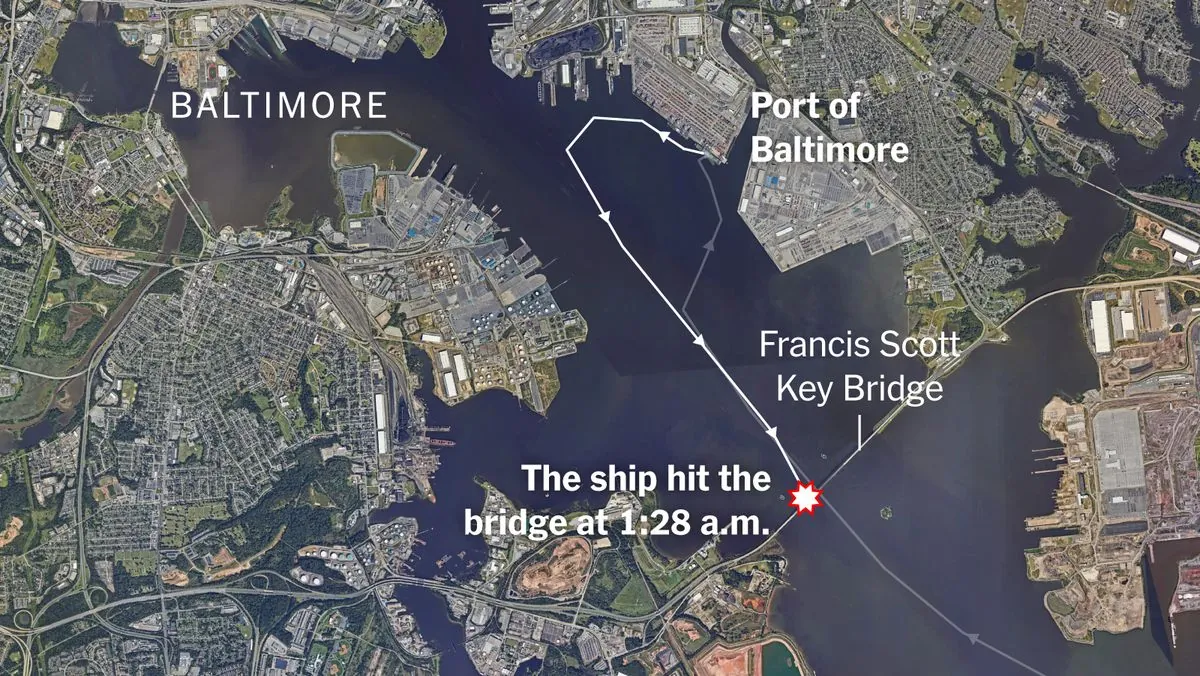US Government Sues Ship Owner for $100M Over Baltimore Bridge Collapse
The US Department of Justice has filed a civil negligence lawsuit against the owner and operator of the container ship that destroyed Baltimore's Francis Scott Key Bridge in March, seeking $100 million in damages.

The United States government has initiated legal action against the entities responsible for the container ship that caused the destruction of Baltimore's Francis Scott Key Bridge in March 2024. This development marks a significant step in addressing the aftermath of the tragic incident that claimed six lives.
On September 14, 2024, the Department of Justice announced its decision to pursue a civil negligence case against Grace Ocean Private Limited and Synergy, the owner and operator of the vessel named Dali. The government contends that the catastrophe was preventable and is seeking $100 million to cover cleanup expenses.
The Francis Scott Key Bridge, named after the author of the US national anthem, was a crucial infrastructure component in Baltimore, which serves as Maryland's largest city and a major seaport. Opened in 1977, it held the distinction of being the third-longest continuous truss bridge globally before its untimely demise.

The incident has brought attention to the complexities of maritime operations and safety. Container ships, which can reach lengths of up to 1,300 feet and transport over 20,000 containers, pose significant challenges in navigation and accident prevention. The Port of Baltimore, handling more than 10 million tons of cargo annually, plays a vital role in the region's economy, making the bridge's collapse particularly impactful on transportation and commerce.
The legal proceedings initiated by the US Department of Justice, an institution established in 1870, will likely delve into intricate aspects of maritime law and international regulations. To succeed in this civil negligence case, the government must demonstrate a breach in the duty of care by the ship's owner and operator.
"This tragedy was avoidable and we are committed to holding the responsible parties accountable for their actions."
The aftermath of such maritime accidents often extends beyond immediate structural damage. Environmental concerns, potential oil spills, and the arduous task of recovering sunken vessels and debris can prolong the impact for months or even years. The National Transportation Safety Board, responsible for investigating major transportation accidents in the US, will likely play a crucial role in determining the factors that led to this catastrophe.
As the legal process unfolds, this case may set precedents for maritime safety and liability. The outcome could potentially influence future regulations and procedures in the shipping industry, emphasizing the need for enhanced safety measures to prevent similar incidents.
The Francis Scott Key Bridge collapse serves as a stark reminder of the delicate balance between commercial maritime activities and infrastructure safety. As cleanup efforts continue and legal proceedings commence, the incident's far-reaching consequences on Baltimore's economy, transportation networks, and the broader maritime industry will undoubtedly be felt for years to come.


































